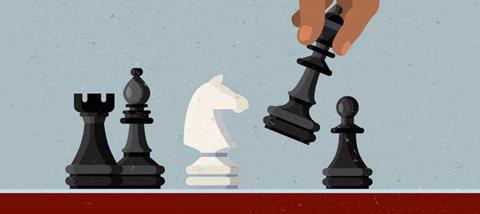
How many times have you heard: ‘If God is all powerful and good, then why is there so much suffering?’ The question is older than Job, who ponders this in the Bible. Like most of us, Job makes the mistake of concentrating on the nature of suffering rather than the power of God.
The answer lies in God’s sovereignty and omnipotence, but it is obscured by our own conceptions of how this works.
After God created a perfect universe, sin entered and spoilt it, but God has said that he will restore holiness and justice to the earth and fill it with the full light of his presence. The Bible tells us that he is all-powerful, so whatever he wants to happen is what will happen. All Christians believe this – that nothing can prevent God from carrying out his plan – but how does he do it?
THREE WAYS
Calvinists regard God as being like a puppet master who moves every person and every atom exactly as he wishes. Others liken him to a chess player who manipulates some pieces in order to encourage other pieces to move into the positions he has planned for them. Still others think that God is like a warrior who fights negative forces to enable people to move in the direction he wants. All three strategies will result in God achieving his plan. But which is the most biblically accurate image of how he exercises his control?
The Bible can provide proof texts for all three, but for a correct understanding it is important that we consider these in context. The easiest way is to look for places where there are indications that all three occur. In Exodus, for example, we can see God working like a puppet master when he hardened Pharaoh’s heart, and then punished him for his hard heart.
Also, like a chess player, God controlled coincidences, so that Moses’ basket floated past Pharaoh’s daughter just when she was bathing. And then, like a warrior, God conquered the Egyptians – Miriam and Moses praised their warrior-God after the Exodus: ‘…he has triumphed gloriously…The Lord is my strength and my song, and he has become my salvation…The Lord is a man of war’ (Exodus 15:1-3, ESV). I don’t think Moses would regard the other two images as wrong, but it is clear that God has no single method. He manipulates like a chess player, he controls like a puppet master and he fights for us.
Actually, if we take a closer look at the Exodus story, we can see that Pharaoh is not a very good example of a puppet because sometimes he hardened his own heart and sometimes God hardened it (eg Exodus 9:34; 10:1). The text suggests that Pharaoh hardened his own resolve and God helped him stick with his decision. So God is portrayed as more like a chess player who encourages his opponent to carry out an ill-conceived strategy than like a puppet master (because a puppet has no resolve). This doesn’t mean that the Calvinist view of a totally controlling God is wrong, but it isn’t what the text portrays here.
THE SPIRITUAL BATTLEFIELD
The image of God as a warrior is very common in the Old Testament. He fights for his people against spiritual enemies and helps his people fight physical enemies. We see this in Israel’s political history, in the prophetic visions and even in poetic praise. The psalmist says that God is a fortress and defence when we are attacked, a rescuer and redeemer when we are captured, and the victor at the end of every battle (eg Psalms 46,59,62).
God’s strategy is complex and mostly hidden
This implies that before they are defended and rescued, his people do suffer. This suffering includes attack, defeat, capture, illnesses, betrayal by friends, famines and sudden poverty. The psalmists and prophets constantly praise God for delivering his people from such suffering. God is not portrayed as preventing suffering, but as helping his people come through it.
God doesn’t change, and his strategy was the same in New Testament times. Paul recognised that God sometimes acts like a chess player – such as when God closed some doors and opened others in order to direct him to Macedonia (Acts 16:6-10). And sometimes Paul regarded God as a puppet master – for example, God’s hardening of Pharaoh’s heart (in Romans 9:17-18); although we must remember that Paul knew (just as we do) that Pharaoh also hardened his own heart.
NOW WE SEE IN PART
Paul mostly regarded God as a warrior and victor – as someone who redeems and rescues his people from principalities and powers (see Romans 8:37-39). In fact, Paul boasted about the suffering he went through: shipwrecks, beatings and even stoning (2 Corinthians 11:23-30). In his epistles written from prison, he didn’t wonder why he was suffering; instead he rejoiced in being able to suffer for Jesus! He regarded suffering as negligible in the light of the final victory (2 Corinthians 4:7).
God’s sovereignty in the Bible is magnified when, like Paul, his people continue to follow and trust him even though they are going through hardship. CS Lewis portrayed this in the Chronicles of Narnia: while the White Witch personally entertained Edmund with Turkish delight and sleigh-rides, Aslan’s followers were persecuted and embattled. But they followed Aslan faithfully even though they rarely saw him.
God’s strategy is complex and mostly hidden – we certainly cannot see it in full yet – but the Bible gives us some valuable glimpses into what he is doing and how to identify him at work in all things. From internal moral conflicts to illnesses or armed opponents, we can rely on God’s strength to help us endure suffering and believe in the timing of his rescue. Meanwhile we wait: we wait for the final victory…and for the end of all suffering.


























